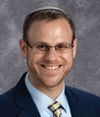Remembering Rabbi Maurice Lamm: From Strength Comes Sweetness
About seven years ago I was a newly-minted rabbi, having recently begun serving as spiritual leader of the Albert Einstein College of Medicine Synagogue. I saw Rabbi Maurice Lamm at a family occasion - Tova, his great-niece, and I had married a few years prior - and he quickly began peppering me: How are things going? Are you taking good care of your congregants? And then came the dreaded question: What are you discussing in your derasha this week? Knowing his reputation as a fair but unforgiving sermonic critic, I nervously began my summary. I shared the idea I had developed regarding the distinction between Reuven and Yehuda's respective models of leadership. His nods indicated that he seemed to like the idea.
Finally he asked: "And what's the takeaway?" I explained how the dichotomy offered unexpected wisdom for students on how to effectively navigate the stresses of medical school.
Reading his facial expression again, I knew immediately that my answer was unsatisfactory. "No. You can't say that," Rabbi Lamm said. Bracing for the worst, I apprehensively asked what I had done wrong and how I might improve. In full rabbinic mentoring mode he carefully explained, "Stress is an important subject. But if you've got a really big idea, you can’t waste it on a narrow takeaway. You need to go for the jugular. You've got to speak to a universal theme. A great sermon requires gravitas."
I leave it up to others more qualified than I to assess Rabbi Lamm's larger legacy - from his numerous books including the bestselling The Jewish Way in Death and Mourning to his remarkable pulpit career to his work in chaplaincy and as founder of the National Institute for Jewish Hospice. That early interaction, though, taught me three crucial lessons:
-
The importance of the derasha - Along with with his brother Rabbi Norman Lamm, Rabbi Maurice Lamm was an old-school rav who believed in the power of the rabbinic sermon to inspire and, over the course of an extended period, craft a community. His own derashot were the stuff of legend and exceedingly well-received by his communities, most prominently Congregation Beth Jacob of Beverly Hills. A Dvar Torah is important - but it should never be confused with a sermon.
-
Never hold back - Rabbi Lamm lived his whole life "going for the jugular." He was an incredibly hard worker and tenacious in the face of literally decades of complex, at times life-threatening medical challenges. He was a fighter who reminded us to keep working and never take anything, above all life itself, for granted.
-
Love your people - Rabbi Shmuel Goldin, who worked under Rabbi Lamm at Beth Jacob for two years, spoke beautifully on this theme at Thursday's levaya. Rabbi Lamm taught by example that Jewish leadership is predicated on loving unconditionally. This was the hallmark of his rabbinate and pastoral work. Even more important, Rabbi Lamm reserved his highest, deepest love for the members of his family.
The fusion of these characteristics was central to Rabbi Lamm's persona. At the funeral a number of his grandchildren noted the passuk from Shoftim emblazoned upon Rabbi Lamm's tallit: "mei'az yatza matok, from strength emerged sweetness," a reference to the riddle posed by Shimshon to the Philistines. For Rabbi Lamm, despite the apparent tension, there was never a contradiction between strength and compassion. He effortlessly wove these attributes into a wonderfully integrated personality.
Indeed, as this rare combination was the source of his charisma, what Rabbi Lamm said of the ideal derasha may be said of himself: he possessed true gravitas. That gravitas enabled him to serve and inspire an entire generation.
May his memory serve as a blessing.
